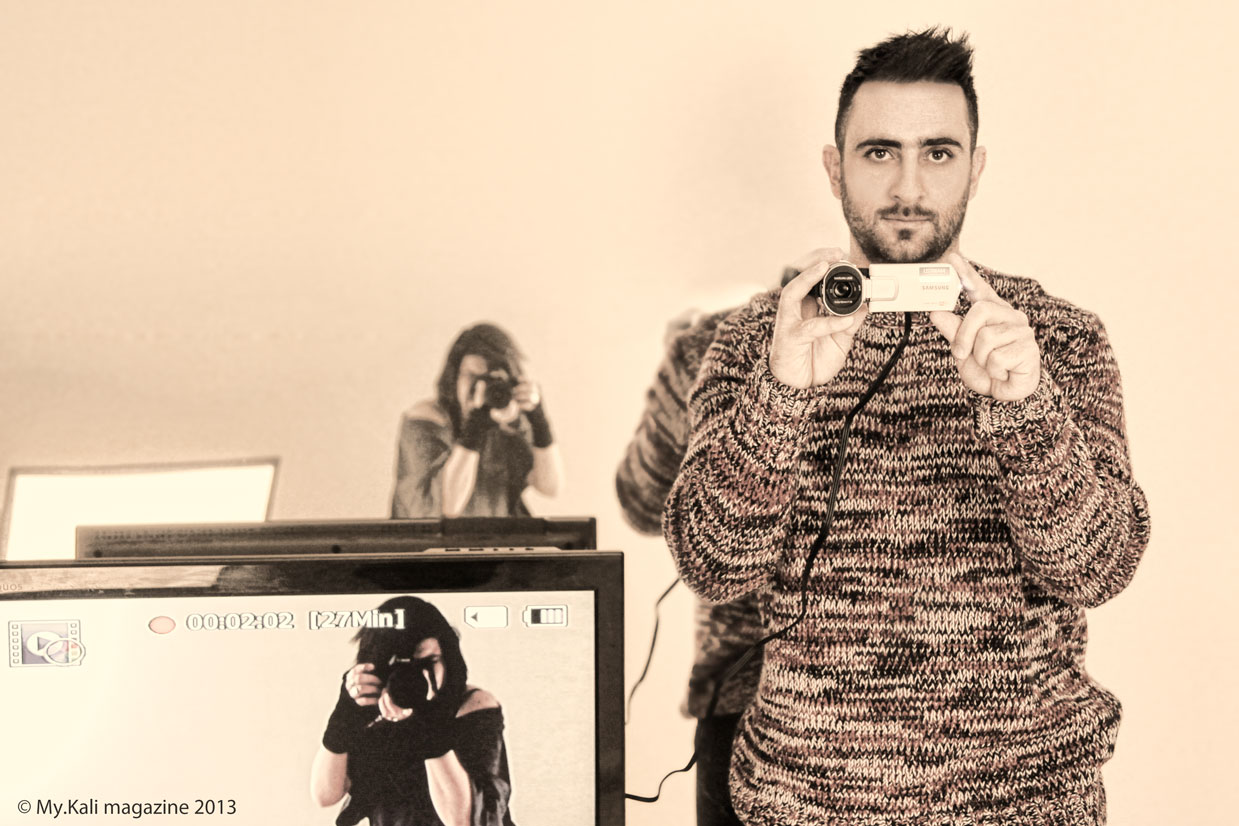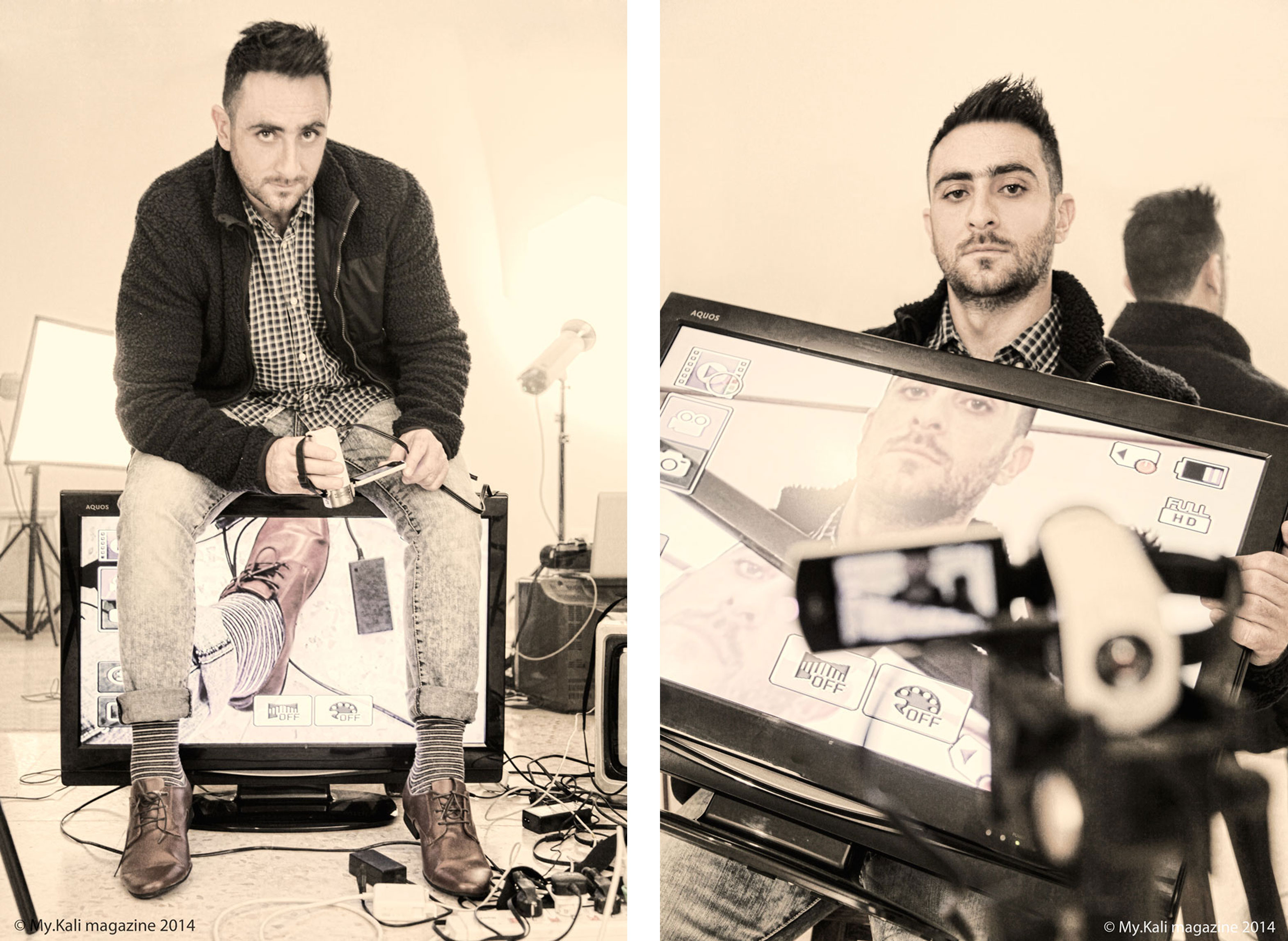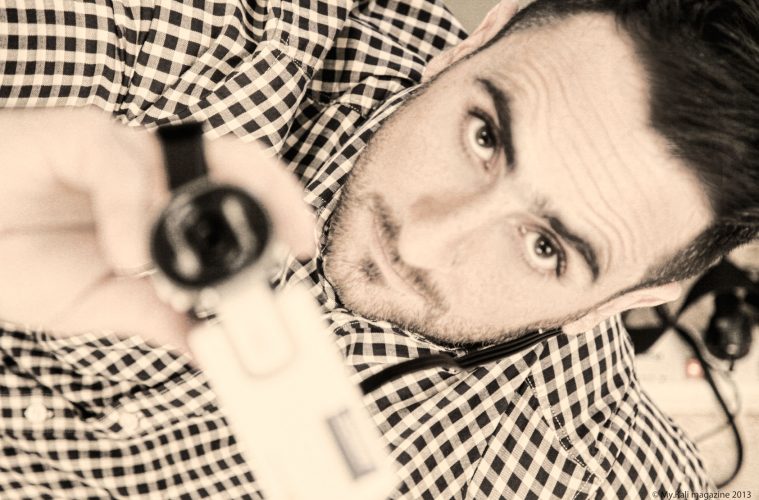Article by Mike V. Derderian
Feature editor by Eliza Banks
Photographs by Hiba Judeh
Make-up by Amer Atta
Hair by Ahmad Al Sa’ady
Styled and making of video by Ala’a Abu Qasheh
Photo edited and art directed by Khalid Abdel-Hadi
Cover/promo design Atef Daglees
Special thank to H&M.
“Excuse me but are you Fadi Zaghmout the writer? Sorry to intrude but I saw the book and overheard parts of your conversation,” explained the young Jordanian lady. “Your book spoke to me! My mother could not believe it was written by a man!”
It was a striking illustration of the hype surrounding novelist Fadi Zaghmout, expressed as we sat for an interview at one of Amman’s busy coffee shops. I’d already seen the novel Aroos Amman — the Bride of Jordan — at locations all over the city, and read it myself in one sitting. I knew, too, why the book had such an impact. Zaghmout was addressing issues that really matter in a society plagued with backward-thinking men posing as university professors, thinkers, writers and greedy politicians.
The book is a brilliant social commentary on an Arab society filled with mothers, daughters and sisters; working women; married women; divorced women; women pursuing academia; sexually active women and forlorn spinsters dreaming of the perfect Arab catch. Of course it also sheds light on the misogynistic Arab man; the oppressive father; the married man; the cheating husband; and the self-righteous cousin looking for an excuse to burst the bubble of any over-achieving female in his tribe.
The main controversy surrounding Aroos Amman likely erupted from the pages of the chapter in which a man thinks aloud after making love — to another man. I have to admit, it was a shocking thing to read in a book written by an Arab Jordanian writer. But anyone reading Zaghmout’s book knows that the scene was far from just sexual, and that the book addresses homosexuality in a mature way. Aroos Amman is in no way exploitive literary fiction, and it’s clearly driven by the thought process that drives Zaghmout’s words and observations. Before writing the much hyped novel, Zaghmout was known for his blog, The Arab Observer, and according to My Kali, he is one of the most followed Tweeps in Jordan. Homosexuality is a tip of the iceberg that the young Jordanian’s worded ship runs into.
Abuse of children and adults, rape, pedophilia, violence against women, sexuality, religious coexistence, and personal freedom are all issues tackled in the book. Although Zaghmout says he wasn’t intent on becoming a mouthpiece to Arab women, he seems to have become one — and a rather loud one too.
The manner with which a complete stranger, the young Jordanian woman, intruded on a conversation between a writer and a journalist in a crowded cafe, introducing herself as a woman who finds his words reflective of her existence, demonstrates Zaghmout’s craftsmanship. She said, “When I learned it was written by a man I was shocked. I said to myself that it is impossible that it was written by a man… It very much expresses how we feel and think. The way you wrote it just voices us.”
Once you read past Chapter Two, you will forget the name Fadi Zaghmout and experience the lives of Hayat, Salma, Laila, Rana and Ali. You will forget, actually you won’t care, that Aroos Amman, The Bride of Jordan, a celebration of womanhood, life and coexistence, is written by a man.

Fadi is wearing a purl-knit marled jumper in organic cotton with roll edges at the hem and cuffs with a slim low-rise jeans in washed stretch denim. All from H&M.
Who is Fadi Zaghmout?
I started introducing myself as a writer after Aroos Amman was published. Before that, I was a blogger. My main work revolves around social media.
When motivated you to write your novel?
I had some short stories and many ideas. I started writing it in 2009. I had to quit my job, eventually, so I could to publish it.
I sensed that your novel aligns with your character as The Arab Observer. It is a novelized observation of the society in which you live in. It is one big social commentary that is reflective of realities that many deny their existence in a society that is a blend of Muslims and Christians. But, do you think you “overdid it” in terms of the events that unravel as the novel progresses?
Each character tells a story. Some people might say this of some characters and events. It is more a work of activism than just a novel. It all depends on how people perceive it. A woman once told me that she wasn’t able to quote anything from it. On another occasion, a different woman said she couldn’t leave the marker down. Not everyone understands what literature is and what it is not. Even though this is my first novel, I wouldn’t go around saying ‘this is my first shot at writing, so be nice to me.’ I would never do that.
This brings me to my next question: what can you tell us about your tumultuous night with a local book club?
I think they were the only ones who did not like it. A lot of women thanked me because they identified with some of the characters. The overall feedback was great. I went to this event that over 60 people attended, but the manner with which the Q & A was conducted was more against the book than about the book. The moderators were talking about the negative aspects and assessing my work without allowing anyone else to interject or discuss the topics that arose. It was as if I were a contestant in Arab Idol. I was left to discuss everything at the end of the session. It was a generally negative evening, which was shocking considering the other positive feedback I had received. One went as far as telling me not to write again. Another chided me for going on television to talk about the book. A woman said it was like Abeer’s Stories.
After finishing your book, it seemed like the overall theme was a call for tolerance. Having experienced such an evening, what would you tell anyone who wants to become a writer about receiving feedback/criticism?
You have to have a thick skin, of course, and lots and lots of patience. It is not easy to commit a year or two of your life writing a novel. In the end, when the book is out there, you will be hearing a lot of comments. One of the most bizarre comments came from a Christian Jordanian family whose members objected to the serving of alcohol by the Christian family in the novel. They loved the book, and that was there only objection. The overall feedback helped shape my thinking process regarding my second book and how I am going to approach it.

Left: Long-sleeved shirt in checked cotton poplin with a button-down collar. Wool jacket. Low-rise jeans with a hard-washed denim look. Brown leather shoes. All from H&M.
Your book includes a Christian woman who elopes with a Muslim man, and a Gay Muslim who is hiding his homosexuality by getting married. Did you get any harsh criticism regarding such depictions in your book?
Christian readers from Jordan were somehow more tolerant about my book, and there was also positive feedback from Muslim readers . There was also a lot of bad-mouthing of the book in order to prevent it from gaining attention in Jordan. Most of the issues I brought up in my book were avoided during the Inkitab session, and someone even said that such issues do not exist in our society.
Did someone actually say you are a ‘’Feminist Mouthpiece’’?
There were a lot of people who said that, and there were women who said I voiced their concerns. I am not offering as solution to sexuality, as someone suggested. The book is about the things we face in our society.
How many drafts did you go through with Aroos Amman?
I didn’t go through a lot of drafts. I was going back and forth within the original manuscripts, doing edits after the writing of each chapter.
You have a lot of characters with interconnected lives. Were you constantly reminding yourself not to use any cliché characters?
Yes, I avoided doing so. I tried to bring new characters to light, like with the Circassian man who eloped with a Christian woman. They stayed together and did not yield to societal pressures that wanted to split them apart. Society is constantly trying to shatter the trust that exists between a man and a woman. Another example is the wife decided to stay with her husband after discovering he was homosexual. A lot of people did not like that plot twist. I did not like writing it, but I wanted to draw sympathy towards this character. I wanted readers to realize that women are subjugated to all sorts of ordeals.
Do such marriages “Velvet Marriages’’ exist in our society?
They do!
Hayat is quite liberal in her approach to life and men. Did you give her the name “Life” on purpose, so as to pit life against life? By doing so, are you announcing to the world that each and every life has value in itself?
She is hope. In spite of everything she went through, she managed to achieve happiness. My novel is about marriage and how much importance it holds in our society, especially for women. She was not a virgin, yet she managed to find a man who loves and marries her.
Hayat did not kill her father, though he raped her. Do you think this makes the situation more realistic and reflective of how similar incidents of rape by a father or brother might be handled in our society?
Not all cases go unnoticed. It is a rather complex situation. He is still her father. I heard of a real story in which the woman involved has a rather normal relationship with her father. Real life, at times, is far weirder than fiction, and there are many stories with different endings than the ones we would hope for.
To switch gears, what do you think constitutes a popular blog like yours?
There are many issues that are not covered, as they should be in traditional media, and this is rather frustrating. You need a liberal voice, and one that is in Arabic. The issues I cover(ed) on my blog were new on the scene, and I think what helped me was the boom in blogging. The issues that I covered were issues that mattered.
 What about you being one of the most popular Tweepers in Jordan?
What about you being one of the most popular Tweepers in Jordan?
Having many followers, even if we were talking in numbers, like 300, 000 followers, gives you a lot of leverage. The best way to get good following on Twitter is to follow other Tweeps and interact with them.
What other countries have you been published in?
Beirut!
What about Egypt?
Not yet. I don’t know why we haven’t published it there. Let’s say I am working on that. There is a problem of distribution in Jordan.
You had an interview on Ro’ya TV, during which you corrected the interviewer when she used a derogatory term to describe homosexuals. Do you believe Arab societies will come to accepting homosexuals as part of their society?
I do, but I don’t know how far we are. People are now learning more about homosexuality and becoming more aware. Everything is out there, however we haven’t fathomed how much the world is changing as a society. On a different note, our schools should introduce sexual education as children currently grow up without knowing the meaning of “sexuality.”
How much of Fadi Zaghmout exists in Aroos Amman?
A large portion of me is in there. My voice is definitely in there, and as we have discussed, it is a work of activism.
Are you working on a new book?
Yes, it is called, Heaven on Earth. I am writing the final chapter. It is a social science fiction novel about life and death. I am writing it because I fear death a lot. I was trying to build a utopian world but I ended up creating a dystopian one. If 3aroos Amman was bold, this one is insane.Do you have any advice to give aspiring writers?
Write. A lot of people hesitate by saying, “we don’t have the time.” Just sit and write. Some are also afraid to voice their own thoughts. You also need a lot of patience — a lot of patience.
Watch behind the scenes of Fadi’s shoot

